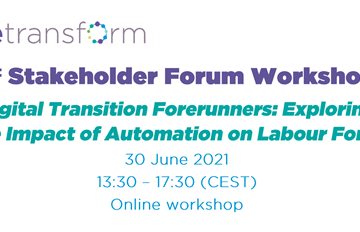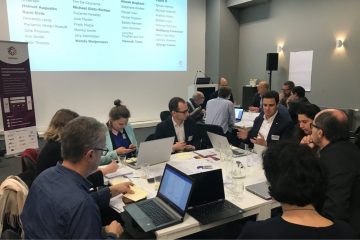The LEVITATE Stakeholder Reference Group met for the second time in the project’s lifetime for a workshop held on 26 November in Brussels. 37 people from across Europe, including many representatives of local and regional government, took part. The workshop provided an overview of the mechanics of the launch of the developing Policy Support Tool, which will be one of the main outputs of the project and is being established to enable policy makers and planners to run their own assessment of the potential impact of connected and automated transport systems in their city or region and across several transport policy domains.. Valuable insights were collected on how to further develop this tool.
The aim of LEVITATE’s Policy Support Tool (PST) is to help public authorities predict the impact of connected and automated transport systems (CATS) and identify policy interventions to help achieve certain long-term mobility goals and/or to mitigate the potential negative effects of vehicle automation. A variety of stakeholders attended the meeting: local and regional authorities, national authorities, national road operators and researchers.
The workshop opened with an introduction by Suzanne Hoadley (Polis) on the vision of Polis on automation and other European projects related to automation, followed by Pete Thomas (Loughborough University), who introduced the LEVITATE project, its objectives and the aim of the workshop.
The first session focused on giving an overview of the Policy Support Tool (PST): its components, what it can and cannot do, what input will be required and what the output might look like. George Yannis (National Technical University of Athens) demonstrated how the tool could work in the future, based on different assessment methods. He also presented one practical case to illustrate the tool’s expected functioning, doing so in a step by step process.
The different CATS impact areas were presented by Rune Elvik (Institute of Transport Economics), followed by an explanation of why they were selected (for more information on the impacts of CATS you can consult this report). Wolfgang Ponweiser (Austrian Institute of Technology) gave an overview of the CATS policy interventions (related to urban transport, economic incentives, access and space allocation). He introduced the backcasting method as a tool to predict the impacts of CATS, highlighting that backcasting starts with the city’s vision – the targets cities want to achieve.
After these presentations, the participants broke up into four smaller groups to discuss the PST and the backcasting methodology. Participants gave their views on the PST structure that had been presented, its usability and the functionalities it should have, and reflected on the reasons why they would use it. The challenges that could be faced during the development of the PST were also discussed, and some ideas on how it could be improved arose. During the discussion, participants also provided insights about the policy interventions they considered to be the most relevant.
Their feedback was collected by the project partners, who closed the session by reflecting on the main conclusions of the workshop and laying out the next steps for the LEVITATE project.




